|
|
|
Sort Order |
|
|
|
Items / Page
|
|
|
|
|
|
|
| Srl | Item |
| 1 |
ID:
001850
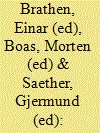

|
|
|
|
|
| Publication |
London, Macmillan, 2000.
|
| Description |
xii,223p.,figures, maps and tables
|
| Standard Number |
0333773810
|
|
|
|
|
|
|
|
|
|
|
|
Copies: C:1/I:0,R:0,Q:0
Circulation
| Accession# | Call# | Current Location | Status | Policy | Location |
| 042973 | 305.80096/BRA 042973 | Main | On Shelf | General | |
|
|
|
|
| 2 |
ID:
178528
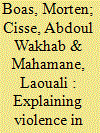

|
|
|
|
|
| Summary/Abstract |
The Tillabéri region in Niger has quickly lapsed into a state of violence and come under the control of ‘violent entrepreneurs’ – that is, non-state armed actors possessing some kind of political agenda, which is implemented in tandem with different types of income-generating activities. Violent entrepreneurs rule by force and violence, but they also distribute resources, provide some level of order and offer protection to (at least parts of) the population in the areas they control, or attempt to control. In many local communities in peripheral areas of the Sahel, these violent entrepreneurs have a stronger presence than international community actors and their national allies. This situation is partly the result of spill-over effects from the war in Mali and local herder-farmer conflicts, but the key factors are the ability of jihadi insurgents to appropriate local grievances and the failure of the state to resist this.
|
|
|
|
|
|
|
|
|
|
|
|
|
|
|
|
| 3 |
ID:
082098
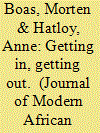

|
|
|
|
|
| Publication |
2008.
|
| Summary/Abstract |
Liberian ex-combatants are generally seen as uprooted urban youths with a history of unemployment, underemployment and idleness. The data that form the basis of this article suggest another picture. What caused the Liberian youth to fight were mainly security concerns, suggesting that the effects of 'idleness' and 'unemployment' are overstated with regards to people joining armed groups. They went to school, worked and lived with parents or close relatives prior to the war. They are not Mkandawire's (2002) uprooted urban youths or Abdullah's (1998) 'lumpens'. They lived quite ordinary Liberian lives, and based their decision on whether to join an armed group on the security predicament that they believed that they and their families were facing. This suggest that disarmament, demobilisation, reintegration and rehabilitation approaches are in need of re-thinking that links them more directly to social cohesion and societal security.
|
|
|
|
|
|
|
|
|
|
|
|
|
|
|
|
| 4 |
ID:
178521
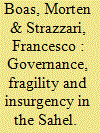

|
|
|
|
|
| Summary/Abstract |
Once a region that rarely featured in debates about global security, the Sahel has become increasingly topical as it confronts the international community with intertwined challenges related to climate variability, poverty, food insecurity, population displacement, transnational crime, contested statehood and jihadist insurgencies. This Special Issue discerns the contours of political orders in the making. After situating the Sahel region in time and space, we focus on the trajectory of regional security dynamics over the past decade, which are marked by two military coups in Mali (2012 and 2020). In addressing state fragility and societal resilience in the context of increasing external intervention and growing international rivalry, we seek to consider broader and deeper transformations that can be neither ignored nor patched up through the framework of the ‘war on terror’ projected onto ‘ungoverned spaces’. Focusing especially on the mobilisation of material and immaterial resources, we apply political economy lenses in combination with a historical sociological approach to shed light on how extra-legal governance plays a crucial role in the deformation, transformation and reformation of political orders.
|
|
|
|
|
|
|
|
|
|
|
|
|
|
|
|
| 5 |
ID:
133260
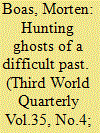

|
|
|
|
|
| Publication |
2014.
|
| Summary/Abstract |
This article explores the relationship between the International Crisis Group's (icg) interpretation of the civil wars in Liberia and Sierra Leone and the main academic 'greed and grievance' debate at the time. It shows that the icg's early policy recommendations were basically in line with the interpretation of these wars as caused by 'opportunistic warlordism'. However, this supposed causal link is less evident in the analytical parts of its early reports, and in the policy recommendations of later reports. These contradictory findings point to both internal developments within the icg and to its 'two faces': it seeks to influence policy makers using detailed empirical analysis on the ground in countries in conflict or transition, but is also aware that policy makers do not generally read long reports, thus it produces executive summary and policy recommendations for this target audience. The article argues that policy recommendations cannot work without the analytical parts of the reports: the analysis sections' main function is to add legitimacy to policy recommendations and the organisation overall, contributing to its image as a genuine 'on-the-ground producer' of crisis knowledge and fostering its expert authority.
|
|
|
|
|
|
|
|
|
|
|
|
|
|
|
|
| 6 |
ID:
124754
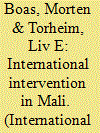

|
|
|
|
|
| Publication |
2013.
|
| Summary/Abstract |
Islamist rebels have retreated from northern Mali; however, a number of challenges for that country remain. The Islamists have gone into hiding but have not surrendered; there is a clear risk of long-term asymmetric warfare. The populations in both northern and southern Mali are divided in their views on the best way forward. The capacities of the Malian government and the Malian armed forces to contain the conflict and retain credible leadership are questionable. This article analyses the Malian crisis with an emphasis on the strategies of key actors, including the Islamist rebels. The consequences of and responses to the conflict are discussed, before the article ends with some tentative conclusions concerning the potential for security in Mali and the Sahel region.
|
|
|
|
|
|
|
|
|
|
|
|
|
|
|
|
| 7 |
ID:
090718
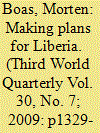

|
|
|
|
|
| Publication |
2009.
|
| Summary/Abstract |
Since the end of the Liberian civil war in August 2003 the international community has been 'making plans' for Liberia. However, it rarely questioned whether these plans were in accordance with the political and economic logic of the peace agreement and the subsequent transitional government. The consequence was that corruption continued and a much more intrusive economic management plan was established. The Governance and Economic Management Assistance Programme (gemap) is supposed to combat corruption and facilitate good governance, but it also limits the range of policy options for the new democratically elected government of Ellen Johnson-Sirleaf. The irony is that the best and most legitimate government that Liberia has ever had is subject to stronger external control than any of its predecessors. The probability that this scheme will remain sustainable when donor interest shifts elsewhere is low, and what is needed is a more pragmatic approach that draws a wider segment of Liberian society into anti-corruption management and creates checks and balances between them.
|
|
|
|
|
|
|
|
|
|
|
|
|
|
|
|
| 8 |
ID:
045953
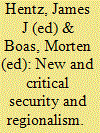

|
|
|
|
|
| Publication |
Hampshire, Ashgate, 2003.
|
| Description |
xiii, 216p.
|
| Standard Number |
0754630277
|
|
|
|
|
|
|
|
|
|
|
|
Copies: C:1/I:0,R:0,Q:0
Circulation
| Accession# | Call# | Current Location | Status | Policy | Location |
| 046957 | 355.033/NEW 046957 | Main | On Shelf | General | |
|
|
|
|
| 9 |
ID:
142183
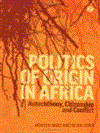

|
|
|
|
|
| Publication |
London, Zed Books, 2013.
|
| Description |
viii, 149p.pbk
|
| Standard Number |
9781848139961
|
|
|
|
|
|
|
|
|
|
|
|
Copies: C:1/I:0,R:0,Q:0
Circulation
| Accession# | Call# | Current Location | Status | Policy | Location |
| 058406 | 320.6/BOA 058406 | Main | On Shelf | General | |
|
|
|
|
| 10 |
ID:
058846
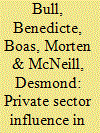

|
|
|
|
|
| Publication |
Oct-Dec 2004.
|
|
|
|
|
|
|
|
|
|
|
|
|
|
|
|
| 11 |
ID:
122839
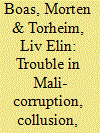

|
|
|
|
|
| Publication |
2013.
|
| Summary/Abstract |
The combined force of the 2012 coup in Bamako and the rebellion in the north entailed an unmasking of Mali. What had been presented as a showcase of democracy, good governance, and peace and reconciliation proved to be a facade for institutional weakness and mismanagement. The collusion between regional and national 'big man' interests that the crisis revealed showed little if any respect for human security and development. This article will analyse the causes of the crisis and the strategies of key actors, including the Islamist rebels. The consequences of and responses to the conflict will also be addressed before the article ends with some tentative conclusions concerning the future stability of Mali and the Sahel region. The article is based on the authors' long engagement with Mali, spanning more than a decade, but the most recent material presented is based on a series of in-depth interviews conducted there in February and March 2013.
|
|
|
|
|
|
|
|
|
|
|
|
|
|
|
|
|
|
|
|
|